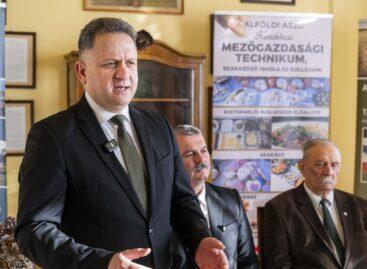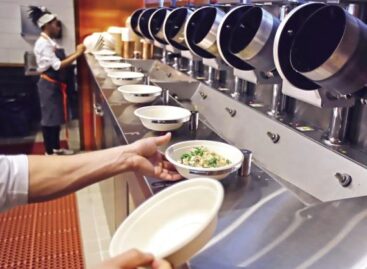András Tállai: “There is strong intent and potential for development in the sector”
András Tállai, state secretary of the Ministry of Agriculture talked to our magazine about the current challenges facing the food economy and the planned responses.
This article is available for reading in Trade magazin 2025/6-7.
![]() How do you see the impact of the agricultural and food industry support programmes announced in 2024 on the sector so far?
How do you see the impact of the agricultural and food industry support programmes announced in 2024 on the sector so far?

András Tállai secretary of state,
MInistry of Agriculture
-These programmes have had a positive influence on the sector, as the significant support framework provided by the EU and national funds made it possible to encourage investment by processing companies. In total around 1,400 applications were submitted for the two CAP calls for proposals published last year, in the value of nearly HUF 760bn.
![]() How has the reform of agricultural vocational training helped to ensure the supply of skilled workers for the food industry?
How has the reform of agricultural vocational training helped to ensure the supply of skilled workers for the food industry?
-These reforms have contributed to reducing the labour shortage in the food industry and will lay the foundations for a competitive supply of skilled workers in the long term. One of the most important changes was to make the training system more flexible. Plus the modernisation of technical training made it possible for young people to acquire up-to-date knowledge on food chain safety, quality assurance, hygiene requirements and digitalisation.
![]() Can we expect another round of applications for CAP funding in 2025 to finance development projects in the food industry?
Can we expect another round of applications for CAP funding in 2025 to finance development projects in the food industry?
– Currently the support system is focusing on evaluating applications submitted in the previous year that meet the eligibility criteria. The goal is to make funding decisions on pending cases as soon as possible.
![]() What steps do you intend to take in 2025 to strengthen supply chains based on domestic raw materials?
What steps do you intend to take in 2025 to strengthen supply chains based on domestic raw materials?
-When evaluating applications submitted under the CAP Strategic Plans, a key criterion is the extent to which the enterprise implementing the development relies on domestic suppliers in its processing activities. Using domestic raw materials is crucial, as it not only promotes economic growth but also supports the work of Hungarian farmers. Hungary has lots of high-quality raw materials that can be competitive on both national and international markets.
![]() Are there any plans for new sustainability or digitalisation incentives for food companies?
Are there any plans for new sustainability or digitalisation incentives for food companies?
– The calls for proposals announced under the CAP Strategic Plans already give priority support to investments aimed at sustainable solutions and strengthening digitalisation. Therefore, there are currently no plans to announce a new support scheme focused exclusively on these objectives.
![]() What developments can be expected in agricultural vocational training in 2025 to better align trade education with industrial needs?
What developments can be expected in agricultural vocational training in 2025 to better align trade education with industrial needs?
-In 2025 developments in agricultural vocational training will focus on closer alignment with the rapidly changing needs of the labour market. The goal is to create a training environment that provides future food industry professionals not only with technical knowledge, but also with key competencies such as problem solving, cooperation and the use of digital tools.
![]() A big KMÉ (High Quality Food) campaign has been launched recently. What can you tell us about further plans and results?
A big KMÉ (High Quality Food) campaign has been launched recently. What can you tell us about further plans and results?
-The objective of the KMÉ campaign was complex: it wished to familiarise consumers with this quality label and call the attention of manufacturers to this opportunity. Feedback from both the public and the industry has been positive so far. One of our further goals is to promote sustainable food industry solutions: the KMÉ trademark supports environmentally friendly packaging, the use of renewable energy sources and local ingredients. //
Related news
Agricultural vocational training also places great emphasis on irrigation development
🎧 Hallgasd a cikket: Lejátszás Szünet Folytatás Leállítás Nyelv: Auto…
Read more >The Hungarian Food Book is 50 years old
🎧 Hallgasd a cikket: Lejátszás Szünet Folytatás Leállítás Nyelv: Auto…
Read more >








